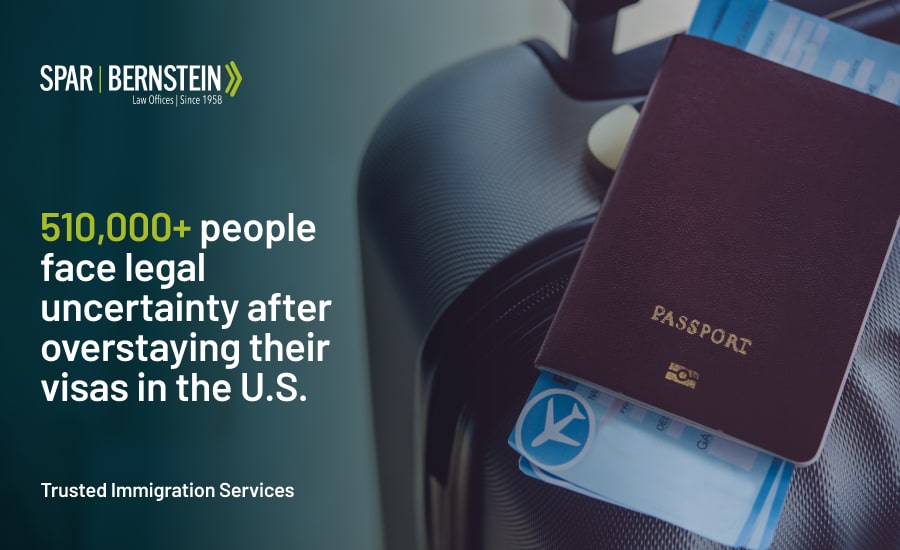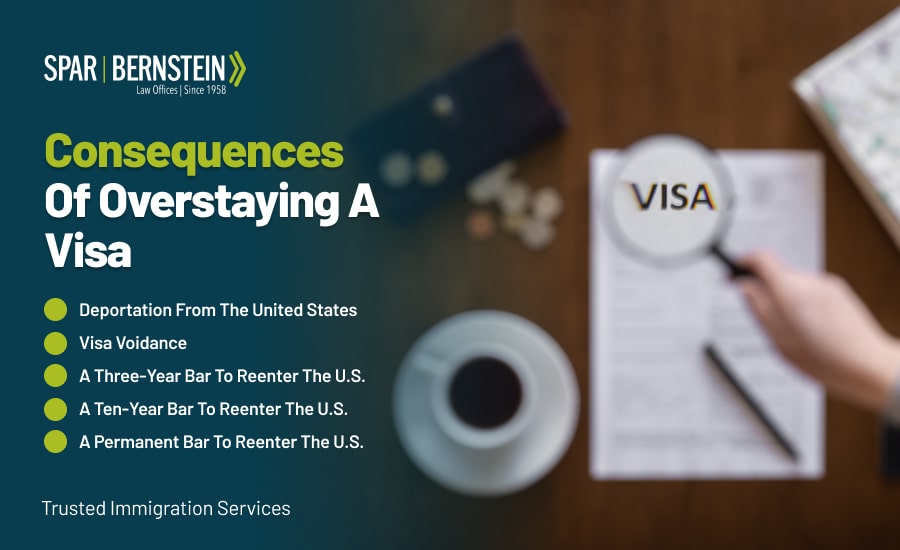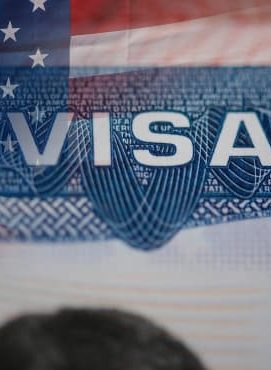

Visa Overstay: Key Takeaways
- Overstaying a visa can lead to serious consequences, including visa voidance, deportation and bar to reenter the country for a certain period
- You can remain in the country if you go through an adjustment of status process that allows you to file for a Green Card
- To be eligible for adjustment of status after you have overstayed your visa, you must have entered the United States legally and have an immediate relative who is a U.S. citizen
More than 510,000 people are suspected of overstaying their visas in the U.S., according to a report by the Department of Homeland Security (DHS).
If you are in the United States and have overstayed your visa, or it is about to expire before you plan to leave the country, serious legal consequences may be around the corner.
We’ll break down:
- What it means to overstay a visa
- The legal consequences you could face
- Valid reasons for overstaying
- How to check your overstay status
What Does It Mean To Overstay A Visa?
Overstaying a visa means you remained in the U.S. longer than allowed. The time allowed is listed on your Form I-94, Arrival/Departure Record, which is issued by the DHS to every alien entering the country.
The form has the date you arrived in the U.S. and the date before which you must depart.
Your visa’s departure date is different from the expiration date, which is stamped on your passport.
How are they different?
Your visa expiration date shows how long your visa can be used.
Your approved length of stay shows how long you can remain in the U.S. after your arrival.
For example, you might have a U.S. visa that is valid for ten years. During these ten years, you can enter the country multiple times. Your Form I-94 will list each of your approved stays, which could span several weeks to several months.

What Are The Consequences Of Overstaying A Visa?
If your approved stay is over and you are still in the United States, you lose your lawful status and immediately begin to build unlawful presence.
The consequences may include:
- Deportation from the U.S.
- Visa voidance
- A three-year bar to reenter the U.S. if you remained in the country unlawfully for more than 180 days but less than one year.
- A ten-year bar to reenter the U.S. if you remained in the country unlawfully for a period longer than one year.
- A permanent bar if you reenter or attempt to reenter the U.S. after having accumulated more than one year of unlawful presence (Unlawful presence may accrue during multiple visits to the United States).

Are There Valid Reasons For Overstaying A Visa?
In some situations, you will not accumulate unlawful presence, and your visa overstay will not lead to bars to reenter the U.S.
You might have a valid reason if:
- You are an abused spouse or child who came to the U.S. on a nonimmigrant visa and can prove a connection between the abuse and the overstay.
- You have filed a bona fide pending asylum application with the U.S. Citizenship and Immigration Services (USCIS).
- You have a pending application for either a Green Card, a change of status, or an extension of status.
- You were a victim of trafficking and can prove that it was the reason for your unlawful presence.
- You were under the age of 18 when you entered the U.S.
- You were a beneficiary of the Family Unity program as a close relative of people who were granted Green Cards as farmworkers or under the 1980s amnesty program.
- You obtained protection via Withholding of Removal under the Convention Against Torture, Temporary Protected Status (TPS), or Deferred Enforced Departure (DED).
How To Check If You Have Overstayed Your Visa
One way to check if you have overstayed your visa is to look at Form I-94.
If you don’t have a paper copy of the form, visit the U.S. Customs and Border Patrol (CBP) website.
Enter your personal information and passport number to check whether you have overstayed your visa.
What Is Adjustment Of Status After A Visa Overstay?
Adjustment of status after a visa overstay is the process of obtaining a lawful permanent resident status, also known as applying for a Green Card.
A Green Card gives you various benefits, among which are living and working in the United States.
The application process to obtain a Green Card varies, depending on your individual situation.
Who Is Eligible For Adjustment Of Status After Overstaying A Visa?
Under U.S. law, you are not permitted to file for a Green Card if you overstayed your visa.
However, there are specific situations in which you may still be able to file for a Green Card:
- You have entered the U.S. legally.
- You are the spouse of a U.S. citizen, the unmarried child under 21 years of age of a U.S. citizen, or the parent of a U.S. citizen who is 21 years of age or older.
Being the immediate relative of a Green Card holder is not enough to allow you to apply for a Green Card with an expired visa.
Can You Adjust Your Status If You Entered The U.S. Illegally?
If you came to the U.S. illegally, through the border or were not admitted and inspected at a port of entry, you cannot adjust your status or apply for a Green Card while in the United States.
To apply for a Green Card, you must:
- Return to your home country.
- Apply for a Green Card through consular processing.
After filing your application:
- USCIS will send you a receipt notice confirming that your petition has been received.
- Your application will be reviewed through the National Visa Center (NVC).
- A consular interview will be scheduled.
If your illegal stay (unlawful presence) in the U.S. was fewer than 180 days, there will be no re-entry bar.
If you accumulated more than 180 days of unlawful presence, there’s a high probability you will face a three-year or ten-year bar when you submit your Green Card application.
If you depart the U.S. for consular processing overseas, you may apply for an unlawful presence waiver prior to your departure, if eligible.
Have You Overstayed Your Visa? Call Spar & Bernstein
Applying for adjustment of status after overstaying a visa can be a complicated process.
With 60+ years of legal experience, our team at Spar & Bernstein has helped thousands of people apply for a Green Card and receive immigration benefits in the United States.
Our attorneys work with all types of immigration cases, including permanent residence and Green Cards, family and employment immigration, violations of immigration law and asylum and refugee protection.
Our compassionate and knowledgeable lawyers will:
- Check your visa status.
- Review the details of your situation.
- Explain your options and offer professional advice.
- Help you prepare, complete, and file the necessary documentation.
- Guide you through the paper-heavy process of adjustment of status.
- Handle the communication with the USCIS on your case.
Visa Overstay: FAQs
How do government officials know if I overstayed my visa?
The U.S. government has various tracking tools and procedures to track visa overstays, including:
- Matching entry/exit records
- Biometric programs
- Electronic tracking of exits via airline manifests
- Facial recognition systems
When does a visa overstay begin if I came to the U.S. on a student visa?
Overstaying typically begins once you no longer have a valid student status. You can stay in the U.S. for the duration of your studies if your Form I-94 indicates “D/S” (Duration of Status). Once they end or you violate the terms of your visa, you begin accruing unlawful presence.
What are the most common ways students lose legal status?
Students often fall out of status due to:
- Failing to transfer schools after suspension.
- Letting their I-20 form expire without renewal.
- Withdrawing from school without leaving the U.S. within 15 days.
- Being dismissed for misconduct and remaining in the country.
- Working off-campus without proper authorization.
- Taking too many online-only credits.
Can I stay in the U.S. after withdrawing from school?
If you voluntarily withdraw during a semester, you must leave the U.S. within 15 days to avoid violating your status. Staying after that period without taking action can result in unlawful presence and potential bars to reentry.





